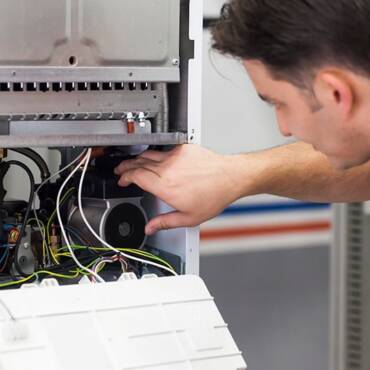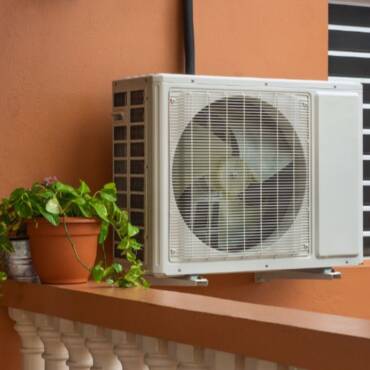Winter is approaching, and faster than many of us care to admit. Right now the leaves are falling and the nights are getting chillier, but before we know it, you’ll be sitting at the window with a cup of hot chocolate while snow blankets the landscape. At least, that’s what you’ll be doing if your heating system is doing its duty. To make sure you can watch the blizzard in comfort and warmth, it’s important to determine which side of the heating system debate you’ll land on: Oil vs. gas heat.
Understanding the Basics
Before we get into the finer details, let’s go over the primary differences when it comes to oil vs. gas heat.
- Oil furnaces: These systems run on oil that’s stored in an onsite tank. This tank is periodically refilled by a company that delivers the oil to your property. In order to create heat, the furnace burns the oil and distributes the heat produced through your ductwork.
- Gas furnaces: These furnaces utilize natural gas that’s supplied through utility lines. The gas is ignited and the resulting warm air is circulated throughout your home.
Both systems deliver the same result: warm air. The difference lies in how that warmth is achieved.
Cost Considerations
When comparing oil vs. gas heat, cost is a big factor. Here’s what you should consider:
- Upfront Costs: The initial cost of each option will likely carry a non-trivial price tag, but one is generally more expensive out of the gate: The oil furnace. This is because you’re purchasing and installing an oil tank in addition to the furnace itself.
- Fuel Prices: Global oil markets are a driving factor in the cost of heating oil prices, making oil furnaces a more volatile investment in this regard. Natural gas, on the other hand, is more stable from a marketplace perspective.
- Heating System Maintenance Services: Gas heating repair and maintenance generally don’t need to happen as frequently as oil system repairs. In addition, with oil, tank cleaning must be factored in, making upkeep costs higher for oil systems.
- Long-Term Savings: Both systems can be updated to high-efficiency models, but gas furnaces have been found to offer better long-term energy savings.
Efficiency and Performance
In addition to cost, efficiency plays a major role in the oil vs. gas heat considerations. After all, efficiency is closely related to cost in the long run. What you’re looking for here is the Annual Fuel Utilization Efficiency (AFUE) rating when researching furnaces. This rating gauges how much of the fuel is converted into usable heat.
Gas furnaces frequently reach an AFUE rating of 90–98%. Oil furnaces, on the other hand, typically sit in the 80–90% range. However, more recent models have been getting higher ratings.
Availability and Accessibility
No matter how preferable one system is over the other, none of that is important if there’s no availability. Depending on geographical location and what services are offered in the area, you may not be able to access certain types of heating systems.
For example, only homes located close to utility lines can take advantage of natural gas lines. Heating oil, on the other hand, is available almost everywhere, which is one reason it remains such a popular choice.
As for the areas we service in Maryland and Pennsylvania, both options are available almost everywhere. We’re happy to provide more details on what’s available in your location if you get in touch with us!
Environmental Impact
The environment has become a hot topic in recent years, and many people factor environmental impact into their purchasing decisions. Here’s what you need to know:
- Natural Gas: Burns clean in comparison to oil, meaning you’re producing fewer carbon dioxide emissions and minimal soot.
- Heating Oil: Produces more CO2 which requires more frequent system maintenance to remediate.
That said, the industry is always changing and adapting. If you prefer oil over gas, more options are becoming available to help you reduce your carbon footprint without switching to gas.
Maintenance and Reliability
We touched on maintenance earlier when discussing costs, but we didn’t really explain what goes into these fixes. Here’s more of a breakdown:
- Oil Furnaces: Require routine cleaning in order to minimize soot buildup. In addition, annual filter and nozzle replacements are a necessity.
- Gas Furnaces: These furnaces require less upkeep than their oil counterparts, but maintenance is still required. Professional inspections and gas heating repair are necessary to keep everything running smoothly, just not as frequently.
If you stay on top of proper maintenance, either type of furnace can last upwards of 25 years.
Safety Factors
As with many large household appliances, you can’t truly weigh your options without considering the safety factor. When it comes to oil vs. gas heat, both present unique safety scenarios. Luckily, the risk is easily minimized in each case.
For oil furnaces, the main concern is possible fuel spills and leaks springing from the tank. If this happens, immediate cleanup is needed to avoid safety hazards and environmental contamination.
When it comes to gas furnaces, the risk of carbon monoxide exposure and natural gas leaks is the primary concern. That’s why CO detectors are a necessity in any household that utilizes such a system.
Holtzople: Reliable Heating System Maintenance Services
Budget, accessibility, environmental impact, efficiency, and more need to be considered when you’re weighing the pros and cons of oil vs. gas heat. Gas may be the option with modern-day bells and whistles, but it’s not available everywhere and there’s no denying the staying power of an oil furnace.
Whatever decision you come to, Holtzople is here to help you with everything from inspection to installation and maintenance. As a leader in heating system maintenance services, we know furnaces of all kinds inside and out. Reach out to us and we’ll make sure your home gets the heating system it needs!
Whether you require installation, repair, or maintenance, our technicians will assist you with top-quality service at any time of the day or night. Take comfort in knowing your indoor air quality is the best it can be with MOE heating & cooling services Ontario's solution for heating, air conditioning, and ventilation that’s cooler than the rest.
Contact us to schedule a visit. Our qualified team of technicians, are always ready to help you and guide you for heating and cooling issues. Weather you want to replace an old furnace or install a brand new air conditioner, we are here to help you. Our main office is at Kitchener but we can service most of Ontario's cities
Source link



